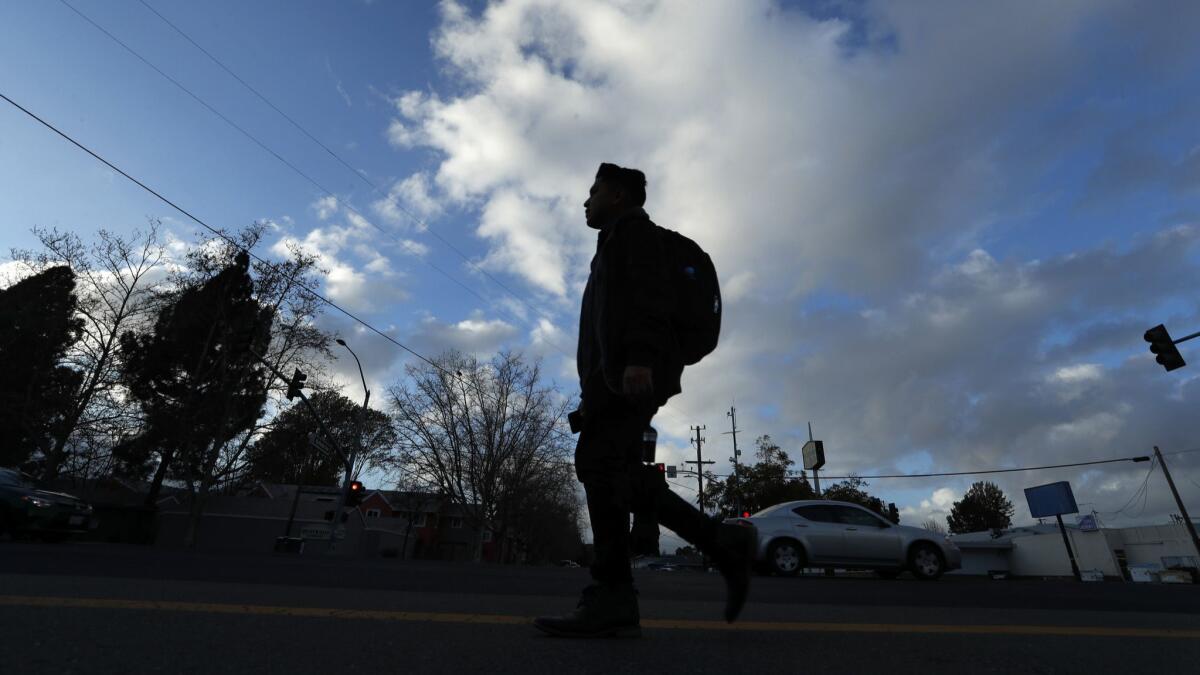Editorial: Why not let homeless college students park in campus lots?

- Share via
Obviously, it’s hard to get through college if you have to worry about whether you will eat on any given day or where you will sleep at night. But that’s the situation that many students in California face. Surveys of the state’s community college students have found that about one in five have been homeless during the previous 12 months. That means they’re sleeping in a car, couch-surfing with friends, or living in an abandoned building or out on the street. Although there are also homeless students in the University of California and California State University systems, the numbers are significantly higher at the community colleges.
The community college system is vast, encompassing 2.1 million students spread across 114 campuses. Many are lower-income, juggling jobs and family and school. Some community college campuses already have food banks and offer assistance to students enrolling in California’s food stamps program, known as CalFresh. Providing housing, though, is more challenging. Only 11 community colleges have any form of dormitory housing on their campuses — and most of those are rural colleges.
A new bill in the Legislature, AB 302, introduced by Assemblyman Marc Berman (D-Palo Alto), aims to help. It would require community colleges to allow homeless students who are living in vehicles to park overnight in campus parking facilities. The students would have to be enrolled in classes and in good standing at the college. It’s not known exactly how many students are living in their cars.
Surveys of California’s community college students have found that about one in five have been homeless during the previous 12 months.
This is a well-intentioned idea that could offer modest but much needed help to homeless students trying to improve their lives despite enormous obstacles. It echoes a similar 2016 state law that requires community colleges make showers in athletic facilities available to homeless students even if they’re not enrolled in physical education classes. That law seems to be working well.
But the homeless-student parking bill raises a host of complicated questions that need to be answered before it goes forward. Would the students have to move their cars out every morning — and if not, is there a risk the parking lots would become permanent encampments? Would the law guarantee space only for students living in their cars or could homeless students also sleep in the parking lots in tents? (The bill is so vaguely worded at the moment that it just offers homeless students “overnight access” to the parking facilities.) What kind of security would all this require? Who would pay for it? What about bathroom facilities? How do you assuage the concerns of the surrounding community, or of other students?
And is this something that ought to be imposed on colleges even if they oppose the idea? What if they raise reasonable objections?
The chancellor of the community college system has not yet taken a position on the bill. Officials say they are working with Berman’s office to refine the language and address concerns. One easy fix: Specify in the bill that this is for students in vehicles, not tents. Berman’s office should also reach out to the League of California Cities to make sure communities understand that the parking lots would be open to homeless students only, not to other homeless people.
Enter the Fray: First takes on the news of the minute »
The colleges have made it clear that they want to grapple with the issue of homelessness and near-homelessness among their students. This is one way to do that. In the Los Angeles Community College District — which did a survey showing that 18.6% of its students had experienced periods of homelessness — officials are still looking into the bill and have yet to take a position. L.A. City College, which is part of the L.A. Community College system, has been exploring the possibility of allowing some overnight parking by its homeless students.
College officials might look at Cypress College President JoAnna Schilling’s efforts to launch a parking program for homeless students living in their vehicles. Schilling has mapped out a plan that would park students in one lot — near the campus security office — and set up portable bathroom facilities. Students would register with campus security and agree, in writing, to a set of rules, including no use of drugs or alcohol. Schilling is still conferring with local officials and community groups about the plan.
Safe parking is not a solution to homelessness. But, properly and carefully undertaken, an initiative such as this one could offer much-needed assistance to students who are already working on improving their lives by getting a college degree, and who deserve what help we can offer.
Follow the Opinion section on Twitter @latimesopinion or Facebook
More to Read
A cure for the common opinion
Get thought-provoking perspectives with our weekly newsletter.
You may occasionally receive promotional content from the Los Angeles Times.









